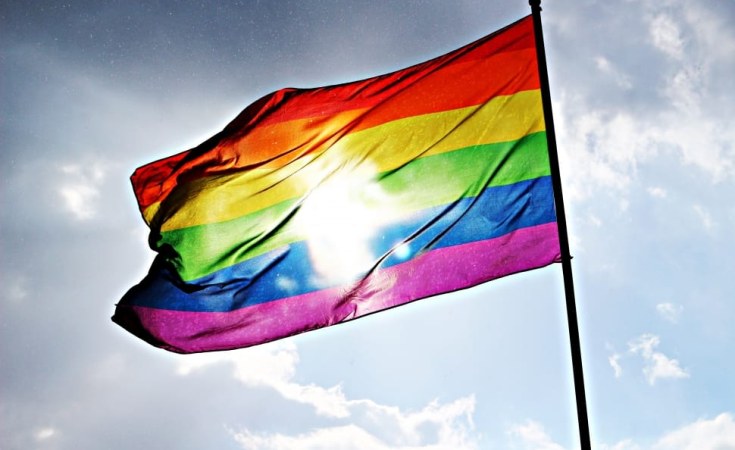As the World Cup kicks off in Qatar this week, controversy is raging over the decision to hold the mega sporting event in a country where gay sex is a crime.
The small Gulf state faced fierce international criticism of its human rights record in the run-up to the tournament, including its treatment of LGBTQ+ people.
In common with most countries in the socially conservative region, same-sex relations are illegal in Qatar, and anyone who engages in gay sex can be jailed for up to three years.
Organisers have repeatedly said everyone is welcome no matter their sexual orientation or background, but many LGBTQ+ fans have voiced concerns for the safety of gay, lesbian and transgender Qataris and of foreigners travelling to the event.
Here's what you need to know.
Why are LGBTQ+ fans and advocacy groups angry?
Most countries in the Middle East, with few exceptions such as Israel, Jordan and Bahrain, ban gay sex and curtail the rights of transgender people.
Several - Iran, Saudi Arabia and Yemen - retain the death penalty for same-sex relations, according to a 2020 report by the ILGA World LGBTQ+ advocacy group. It said certain sources indicated that the death penalty could be a legal option in five other countries globally, including Qatar.
Between 1995 and 2021, ILGA World uncovered at least five instances of anti-LGBTQ+ laws being enforced in Qatar, including a U.S. citizen sentenced in 1995 to six months' imprisonment and 90 lashes for alleged "homosexual activity".
A report on LGBTQ+ rights published last month by Human Rights Watch (HRW) noted six cases of "severe and repeated beatings" alongside five instances of sexual harassment in police custody between 2019 and 2022.
Several interviewees said they had been detained as recently as September this year.
A Qatari official cited by Reuters criticised the HRW report as containing false information
What else have Qatari authorities said?
Qatari organisers of the World Cup have warned visitors against public displays of affection but say everyone, no matter their sexual orientation or background, is welcome.
Qatari Emir Sheikh Tamim bin Hamad al-Thani has said gay foreign fans would be welcome in Doha, though he asked attendees "to respect our culture". Another senior official said that while LGBTQ+ fans were welcome, rainbow flags would be banned.
In September, however, a Qatari World Cup ambassador made more outspoken comments about the issue during an interview with German television.
"(Visitors) have to accept our rules here," former Qatari international Khalid Salman said, adding that homosexuality was "haram", which means forbidden in Arabic.
When asked why that was the case, Salman said: "I am not a strict Muslim but why is it haram? Because it is damage in the mind."
What have LGBTQ+ activists said?
Veteran British activist Peter Tatchell staged a one-man protest outside Qatar's national museum last month over the Gulf state's record on LGBTQ+ rights, holding a placard that read "Qatar arrests and subjects LGBTs to conversion" - a reference to so-called conversion therapy.
The Qatari official cited by Reuters said the country does not license or operate conversion centres.
Tatchell - who held a similar protest ahead of the 2018 World Cup in Russia - protested for more than an hour before being told to move on by police.
Anti-gay laws mean "LGBTQ+ people in Qatar are criminalised for simply existing and are forced to hide who they are", said Robbie de Santos, director of communications and external affairs at leading European LGBTQ+ organisation Stonewall.
"In 2022, it is deeply concerning that countries with appalling human rights records are rewarded with the rights to host one of the world largest sporting tournaments," de Santos told Openly.
LGBTQ+ sporting organisations have long expressed outrage that Qatar was chosen to host the 2022 World Cup by world soccer's governing body, FIFA.
But Angus Malcolm, chair of Britain-based Sport Allies, said the spotlight on LGBTQ+ rights might provoke a wide sea-change in football more generally.
"Change starts with seeing the problem," Malcolm said. "This is a chance to raise the bar for sport and hold its feet to the fire."
FIFA president Gianni Infantino rounded on European critics of the host nation over the issues of migrant workers and LGBTQ+ rights at a news conference on Saturday, adding that engagement was the only way to improve human rights.
What has been the reaction of teams and sporting bodies?
Australia's national team has spoken out against Qatar's record on human rights and same-sex relationships, while Denmark's players will travel to the tournament without their families as a protest against the country's human rights record.
The U.S. team has changed its logo to incorporate a rainbow-themed badge at its training facility in Qatar, while several of the teams' captains planned to wear "One Love" armbands when they took to the pitch.
On Monday, however, the captains of England, Wales, Belgium, the Netherlands, Switzerland, Germany and Denmark said they would not wear the armbands after FIFA made it clear they would be booked.
Both the English and German teams flew out to Doha aboard planes daubed with newly painted pro-LGBTQ livery.
- Reporting by Hugo Greenhalgh @hugo_greenhalgh; Editing by Helen Popper


